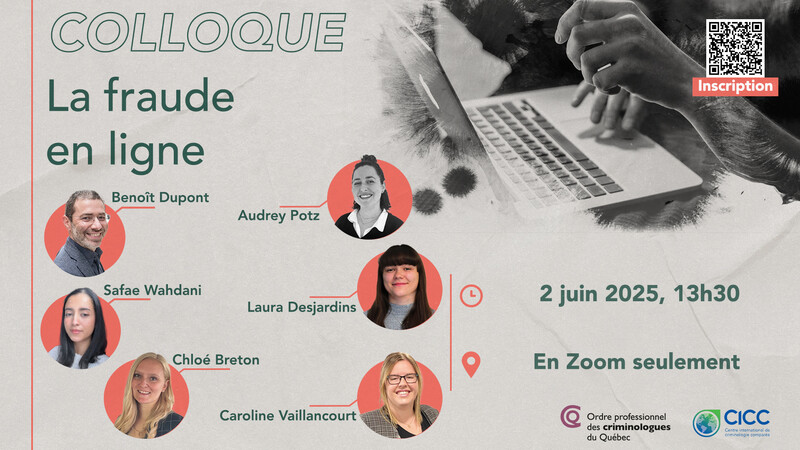
This symposium is co-organized by the International Centre for Comparative Criminology (ICCC) and the Ordre professionnel des criminologues du Québec (OPCQ). It features five academic presentations.
This free event will be recognized by the OPCQ as continuing education for its registered criminologist members.
Monday, June 2, from 1:30 p.m. to 4:30 p.m. (Zoom).


Benoît Dupont (Full Professor, Université de Montréal)
Online fraud is increasing in scale and sophistication, employing artificial intelligence, deepfakes, and social media platforms. It targets a wide range of victims, including those with high levels of digital literacy. Psychological factors such as overconfidence or emotional distress can increase individual vulnerability. Victims require rapid support, educational tools to recognize scams, and psychological assistance to overcome trauma. A comprehensive response that combines prevention, education, and tailored support is essential to address this growing issue effectively. This presentation will provide an overview of the latest developments and trends in this field.

Audrey Potz (Coordinator, Cybercrime Clinic, Université de Montréal)
This presentation offers an empirical analysis of data collected through the Fraude-alerte platform regarding the state of online fraud in Quebec throughout 2024—a year marked by a sharp increase in reports (n = 3,974) and over 600,000 website visits. The findings highlight a notable rise in consumer fraud, especially related to fraudulent e-commerce and fake advertisements. SMS phishing campaigns targeting public institutions (SAAQ, A25, Canada Post) were the most prevalent fraud vectors, while the most significant financial losses were associated with cryptocurrency investment scams. The analysis also explores communication channels used, impersonated organizations, and behavioral patterns among users.

Safae Wahdani (Clinical Analyst, Cybercrime Clinic, Université de Montréal)
This presentation offers a reflective analysis based on the clinical experience developed through interactions with online fraud victims who have contacted the Cybercrime Clinic since March 2025. It will highlight the most frequently expressed needs of victims—including safety, validation, and emotional support—and the intervention strategies used to address them. The challenges faced by victims will be discussed from a clinical perspective, with the aim of better understanding therapeutic and psychosocial levers in this specific context.

Laura Desjardins (Research Analyst, Cybercrime Clinic, Université de Montréal)
This presentation provides a synthesis of best intervention practices for supporting victims of online fraud, as documented in the scientific literature. It will address the psychological, social, and financial impacts of fraud, the issue of victim-blaming, barriers to reporting, and the specific needs of affected individuals. Drawing from empirical studies, the talk will outline key intervention strategies, including professional training, intersectoral coordination, prevention of revictimization, and support for disengagement and post-victimization recovery. The presentation emphasizes the importance of an empathic, validating, and trauma-informed approach that acknowledges the diversity of victimization experiences.

Caroline Vaillancourt
Caroline Vaillancourt has worked as a technician in offender intervention since 2013. She began her career supporting justice-involved women, later moving into the fields of addiction and mental health. She also worked as a program officer for over four years. Her desire to help others and encourage personal growth led her to join the management team in 2022.

Chloé Breton
Chloé Breton graduated with a bachelor's degree in career counseling from Université Laval in 2017. During her internship at the Donnacona penitentiary alongside a parole officer, she began working with an adult justice-involved population. Initially a clinical counselor, she later served as a community intervention worker for over four years. In the fall of 2022, she was appointed Clinical Supervisor at CRC Beauce. In the summer of 2024, she also took on the supervision of community monitoring in the Beauce region.
Summary:
The Arna-Cœur program is an intensive intervention focused on deconstructing behaviors related to theft, fraud, and/or gambling. Through group workshops and individual follow-ups, the clinical team supports residents in identifying their difficulties and motivates them to improve their lifestyle habits. Integrated into this program is Azimut Mirage, a 39-hour module specifically centered on manipulative behaviors and the criminal conduct of fraudsters. Topics include manipulation, the offense cycle, self-awareness, values and perceptions, victim empathy, and the concept of letting go.
Attention - Votre version d'Internet Explorer est vieille de 21 ans et peut ne pas vous offrir une expérience optimale sur le site du CICC. Veuillez mettre à jour votre ordinateur pour une expérience optimale. Nous vous recommandons Firefox ou Chrome, ou encore ChromeFrame si vous êtes dans un environnement corporatif ou académique dans lequel vous ne pouvez pas mettre à jour Internet Explorer.